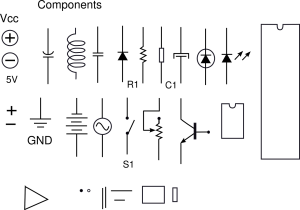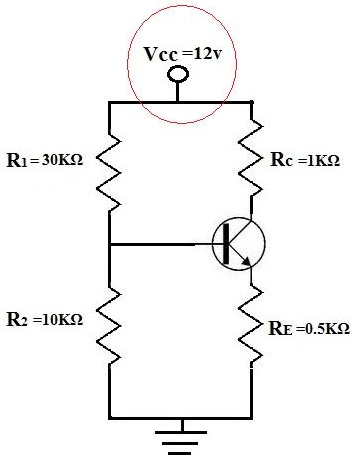Last Updated on October 22, 2023 by Kevin Chen
Photo by Pixabay
Vcc stands for “Voltage (in) Common”. The Vcc is the collector voltage in a transistor and also its common terminal.
It is also known as collector-emitter voltage, or just emitter voltage. The transistor as an amplifier or a switch is one of the most used semiconductor devices in almost every electronic circuit.
It is extensively used in digital circuits, analog circuits, and logic circuits etc. Any general purpose NPN transistor has the base as its input terminal and the collector as output terminal with an emitter that serves as both input and output node for this type of transistor.
Since it has two inputs and two outputs, it can be classified as a dual-input, dual-output device. This article explains what is VCC in transistor step by step with examples so that you can understand it easily if you are new to this subject matter.
What does CC in VCC mean?
CC and VCC are abbreviations for the common collector. These are used to distinguish the collector terminal of a transistor from the other terminals such as emitter, base, and the voltage in the collector.
For example, in an NPN transistor, the collector terminal is the one that will be connected to the positive voltage supply, and the voltage in the collector will be positive as well.
How do you identify VCC in a transistor?
In order to identify the VCC in a transistor, you need to know the type of transistor such as an NPN transistor or PNP transistor.
You also need to know a few things about the pinout of the transistor so that you can easily identify the collector terminal.
The collector terminal in an NPN transistor is the one that is connected to the base terminal through a load. In a PNP transistor, the collector terminal is the one that is connected to the emitter terminal through a load.
How does a VCC in a transistor work?
In a transistor, the VCC is the voltage in the collector terminal. It is supplied by an external voltage source.
The collector voltage is usually positive. In an NPN transistor, the collector voltage is given as Vcc. The voltage on the collector terminal determines the current through the load.
A small change in the collector voltage creates a large change in the current. This is due to the fact that the collector-emitter voltage drop is very small. When the transistor is not conducting, the collector voltage is at about 0 volts. The transistor conducts when the collector voltage is greater than the base voltage.
What voltage is VCC?
The collector voltage is usually positive and supplied by a voltage source. Hence, it is referred to as the collector voltage or Vcc.
It is a voltage across the collector.
Normally, you don’t have to calculate the voltage of a VCC, instead, it is given by the manufacturer. Simply stated, the voltage of this transistor is fixed.
This voltage is given by the voltage source through the collector terminal of the transistor.
The voltage of VCC is also vital in calculating the load line across a transistor.
Is VCC voltage AC or DC?
Image source LearningAbout Electronics
The Vcc voltage is a DC voltage that is supplied by the voltage source to operate the transistor.
It is the voltage across the collector and emitter terminals. It is the controlling voltage for the transistor and its collector current.
Keep in mind that this voltage is constant.
The collector current is the amount of current flowing into the collector terminal. This current is controlled by the Vcc voltage across the collector and emitter terminals.
Key applications of VCC in transistor
– Digital Electronics In a digital circuit, a transistor replaces the switch. Hence, it is used as a switch in a digital circuit. It is designed for high-speed operation.
A transistor is capable of switching large currents. However, the voltage rating is less compared to that of the current rating. Hence, transistors are often used as a current switch.
– Analog Electronics In analog circuits, transistors are used as amplifiers. In some cases, a transistor can be used as a voltage source.
– Power Electronics Power electronics applications use transistors in switching circuits such as power supplies, inverters, etc.
Examples of devices that have VCC in transistor
There are many devices that have VCC in transistors. Some of them are listed below:
- Transformer: A transformer is a device that transfers electrical energy from one circuit to another through inductive coupling.
- Power supply: A power supply is an electronic circuit that supplies electric energy to another circuit.
- Bipolar transistor: Bipolar transistor is a type of transistor that uses both emitter and collector currents to control the flow of current between its base and emitter terminals.
- Field effect transistor: Field effect transistor is a device that can be used as a switch depending on the voltage applied to its gate terminal.
What is the difference between VCC and VBB in transistor
The Vcc voltage is the voltage that is applied across the collector and emitter terminals of a transistor.
Also, the VCC of a bipolar resistor is a DC voltage while that of a VBB is an AC voltage.
It is applied for controlling the collector current. The Vbb voltage is the voltage that is applied across the base and emitter terminals of a transistor. It is used for controlling the base current.
The main difference is that the Vcc voltage is applied across the collector and the emitter terminals of a transistor whereas the Vbb voltage is applied across the base and the emitter terminals of a transistor.
Choosing a reliable transistor supplier in China
Where can I buy a transistor? This is a question that you are likely to ask when it comes to finding and purchasing transistors.
Other than just knowing the role of VCC in transistors, you should also strive to find the right suppliers and distributors.
And this is where ICRFQ comes in.
We are a reputable supplier and distributor of transistors in China.
Contact us and place your bulk order of transistors for sale.
If you want to find more Electronic Components Distributors, please check out the following articles:
Electronic Components Distributors In the USA
Electronic Components Distributors In UK
Electronic Components Distributors In China
Electronic Components Distributors In India
Electronic Components Distributors In Singapore
Electronic Components Distributors In Malaysia
Electronic Components Distributors In Vietnam
Electronic Components Distributors In South Korea
- Where to buy IC chips? The Best Guide? - March 26, 2024
- Breaking Down Barriers: Overcoming Obstacles in Cross-Border Electronic Component Trade - March 4, 2024
- Everything You Need to Know About Amplifier IC Chips - March 4, 2024






